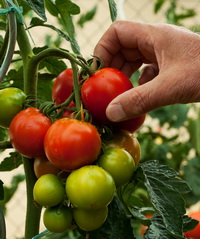
Researchers Use CRISPR-Cas9 to Target Ripening Genes in Tomato
November 28, 2018| |
 Tomato is a nutritious and economically important crop that depends on shelf life as a marketable quality. The shelf life of tomato is affected by softening, which is important in ripening, flavor development, fruit storage, and transportability of the crop. Softening is dictated by changes in cuticle and cell wall characteristics. To investigate the molecular basis of this trait in tomato, researcher Duoduo Wang from University of Nottingham in the United Kingdom and colleagues used CRISPR-Cas9 to edit genes PL, PG2a, and TBG4, which are all related to fruit ripening in tomato.
Tomato is a nutritious and economically important crop that depends on shelf life as a marketable quality. The shelf life of tomato is affected by softening, which is important in ripening, flavor development, fruit storage, and transportability of the crop. Softening is dictated by changes in cuticle and cell wall characteristics. To investigate the molecular basis of this trait in tomato, researcher Duoduo Wang from University of Nottingham in the United Kingdom and colleagues used CRISPR-Cas9 to edit genes PL, PG2a, and TBG4, which are all related to fruit ripening in tomato.
Results showed that plants that have mutation in the PL gene have firmer characteristic, whereas plants that have mutation in PG2a and TBG4 have modified fruit color and weight. The researchers also found that these three genes are acting on different locations in the cell walls. The study further clarifies the roles of these genes in tomato ripening and may serve as basis for future modification of tomato towards longer shelf life.
For more information, read the article in Plant Physiology.
| |
Biotech Updates is a weekly newsletter of ISAAA, a not-for-profit organization. It is distributed for free to over 22,000 subscribers worldwide to inform them about the key developments in biosciences, especially in biotechnology. Your support will help us in our mission to feed the world with knowledge. You can help by donating as little as $10.
-
See more articles:
-
News from Around the World
- Biotech Law Will Be Passed Soon in Uganda, S&T Chairperson Assures Farmers
- Study Shows Plant Characteristics Shaped by Parental Conflict
- Citizen Science Can Play A Role in Addressing Agricultural Challenges
- Argentina One Step Away from GM Wheat Commercialization
- Men More Positive about GM Foods, Survey Says
- Australian OGTR Approves Field Trial of GM Canola
- Study Shows Positive Impact of Bt Cotton Adoption Among Farmers in Pakistan
- Nobel Laureate Rallies Global Support in Favor of GMOs
- Report: Pakistan Achieves Biotech All-Time High in 2017
-
Research Highlights
- Gene Improves Heat and Drought Tolerance in Wheat and Arabidopsis
- Cotton Gene Enhances Brown Fiber Quality
- Development of 3rd Generation Climate Resilient and Dry Direct Seeded Rice Varieties
-
Beyond Crop Biotech
- Research Reveals How Ancient Viruses Got Cannabis High
-
Resources
- Map Shows Public Sector Biotech Products in the Pipeline Around the World
-
Plant
- CRISPR-Cas9 Delivered in Wheat Using Agrobacterium
- Screening for CRISPR and TALENs Edits, Better with Ribonucleoproteins
- CRISPR-Cas12a Applied in Rice
- Researchers Use CRISPR-Cas9 to Target Ripening Genes in Tomato
-
Read the latest: - Biotech Updates (November 12, 2025)
- Gene Editing Supplement (October 29, 2025)
- Gene Drive Supplement (February 22, 2023)
-
Subscribe to BU: - Share
- Tweet
